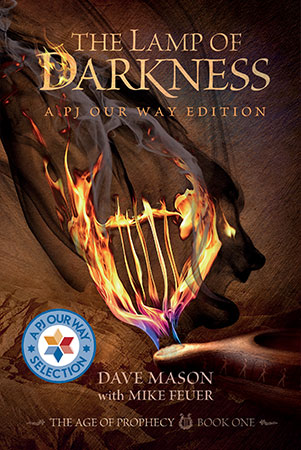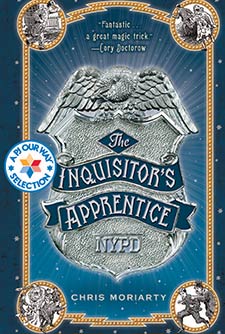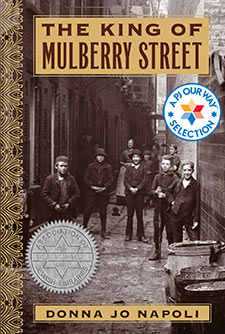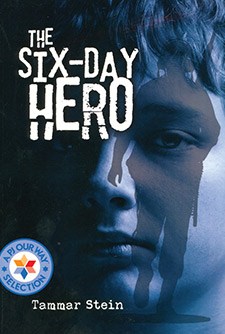The Lamp of Darkness
Twelve-year-old Lev lives a simple life, playing his harp as the sheep graze. But when a mysterious stranger appears, the shepherd boy is thrust into a world of biblical prophets, kings, intrigue and adventure. Life will never be the same again!
Average Rating
( hint: Login to leave a review! )
41 Reviews
Leave Review
What the Book Is About
Jewish Content & Values
Positive Role Models
Content Advisory
Talk It Over
More for You
What the Book Is About
King Ahab, Queen Izevel and the Prophet Elijah come to life in this fast-paced fantasy reinterpretation of the biblical era of the early Prophets. In this well-researched coming-of-age story, twelve-year-old Lev shepherds his uncle’s flock until the Prophet Uriel hears him play his kinnor (harp) and invites him to join a group of prophets as a musician. Lev quickly discovers that his past is far more complicated and mysterious than he could ever have imagined and that his own fate is linked integrally to the history of the Kingdom of Judah and Israel. Readers get a view of the political currents that steer the course of the Kingdom of Judah and Israel during this turbulent historical era.
Jewish Content & Values
- This book is a fictionalization of the era of the Prophets. The main characters (King Ahab, Queen Izevel, Elijah, Uriel, and Obadia) and the geographical and historical background are as described in the Book of Kings. The history of the split kingdoms of Yehuda and Shomron, as well as the legacy of the Priests of the Holy Temple, slowly unfolds as the plot develops.
- Lev follows the recommendation in Ethics of Our Fathers when he chooses to “find himself a Rav,” a spiritual guide, and joins his fate to that of the Prophet Uriel.
- Each chapter of this story is accompanied by a relevant quote from Jewish tradition.
Positive Role Models
- Lev is a sensitive and loyal friend who thinks deeply about the choices he makes and the company he keeps.
- Uriel is a kind and wise man who is not too proud to help anyone in need; when Lev asks him why he used his prophecy for something as trivial as finding a wedding band, he responds that it wasn’t a trivial matter for the couple who lost it. Despite his esteemed stature as a prophet of Israel, he treats Lev with respect and acts as a true teacher to him.
- Aunt Leah, Lev’s adoptive mother, loves him as one of her own. She sends him away because she understands that her sister would never allow her son to live in a home that tolerates idol worship. Uncle Menachem treats Lev like his own child as well; he teaches him Torah along with his son and offers him seed money to build his own flock.
Content Advisory
This book (non-gratuitously) describes violence in biblical times, including Baal worship by cutting, ritual animal sacrifice, and a battle between the prophets and Izevel’s soldiers. Drinking wine and drunkenness are casually portrayed, as per the custom of the day. While none of the individual scenes are particularly graphic or bloody, some young readers, particularly those unaccustomed to traditional biblical study, may find passages relating to animal sacrifice and death disturbing.
Talk It Over
The prophet Uriel says, “Don’t think joy is so simple. I’m not talking about the empty celebration of fools. Real joy takes work, inside and out, more than any other emotion. On Sukkot we choose to rejoice even if we don’t feel joyous.” Have you ever decided to rejoice even when you didn’t feel joyous? When? Were you successful?
More for You
Elijah the Prophet is a mysterious figure referenced in many stories in the Talmud and rabbinic literature. Perhaps the most well-known Jewish reference to Elijah is his standing invitation to the Passover Seder. But did you know that he also has a standing invitation to the Brit (circumcision) ceremony? In fact, many synagogues have an ornamental chair just for this purpose, wide enough for the baby, the sandek (the person with the honor of holding the baby) and Elijah himself. It is part of Jewish tradition that Elijah will return before the messiah to prepare the Jewish nation for that great event, and it is the hope of the parents that their child will live to see that joyous day.
What the Book Is About
What the Book Is About
King Ahab, Queen Izevel and the Prophet Elijah come to life in this fast-paced fantasy reinterpretation of the biblical era of the early Prophets. In this well-researched coming-of-age story, twelve-year-old Lev shepherds his uncle’s flock until the Prophet Uriel hears him play his kinnor (harp) and invites him to join a group of prophets as a musician. Lev quickly discovers that his past is far more complicated and mysterious than he could ever have imagined and that his own fate is linked integrally to the history of the Kingdom of Judah and Israel. Readers get a view of the political currents that steer the course of the Kingdom of Judah and Israel during this turbulent historical era.
Jewish Content & Values
Jewish Content & Values
- This book is a fictionalization of the era of the Prophets. The main characters (King Ahab, Queen Izevel, Elijah, Uriel, and Obadia) and the geographical and historical background are as described in the Book of Kings. The history of the split kingdoms of Yehuda and Shomron, as well as the legacy of the Priests of the Holy Temple, slowly unfolds as the plot develops.
- Lev follows the recommendation in Ethics of Our Fathers when he chooses to “find himself a Rav,” a spiritual guide, and joins his fate to that of the Prophet Uriel.
- Each chapter of this story is accompanied by a relevant quote from Jewish tradition.
Positive Role Models
Positive Role Models
- Lev is a sensitive and loyal friend who thinks deeply about the choices he makes and the company he keeps.
- Uriel is a kind and wise man who is not too proud to help anyone in need; when Lev asks him why he used his prophecy for something as trivial as finding a wedding band, he responds that it wasn’t a trivial matter for the couple who lost it. Despite his esteemed stature as a prophet of Israel, he treats Lev with respect and acts as a true teacher to him.
- Aunt Leah, Lev’s adoptive mother, loves him as one of her own. She sends him away because she understands that her sister would never allow her son to live in a home that tolerates idol worship. Uncle Menachem treats Lev like his own child as well; he teaches him Torah along with his son and offers him seed money to build his own flock.
Content Advisory
Content Advisory
This book (non-gratuitously) describes violence in biblical times, including Baal worship by cutting, ritual animal sacrifice, and a battle between the prophets and Izevel’s soldiers. Drinking wine and drunkenness are casually portrayed, as per the custom of the day. While none of the individual scenes are particularly graphic or bloody, some young readers, particularly those unaccustomed to traditional biblical study, may find passages relating to animal sacrifice and death disturbing.
Talk It Over
Talk It Over
The prophet Uriel says, “Don’t think joy is so simple. I’m not talking about the empty celebration of fools. Real joy takes work, inside and out, more than any other emotion. On Sukkot we choose to rejoice even if we don’t feel joyous.” Have you ever decided to rejoice even when you didn’t feel joyous? When? Were you successful?
More for You
More for You
Elijah the Prophet is a mysterious figure referenced in many stories in the Talmud and rabbinic literature. Perhaps the most well-known Jewish reference to Elijah is his standing invitation to the Passover Seder. But did you know that he also has a standing invitation to the Brit (circumcision) ceremony? In fact, many synagogues have an ornamental chair just for this purpose, wide enough for the baby, the sandek (the person with the honor of holding the baby) and Elijah himself. It is part of Jewish tradition that Elijah will return before the messiah to prepare the Jewish nation for that great event, and it is the hope of the parents that their child will live to see that joyous day.




